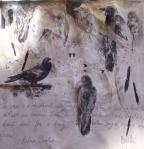Philocetetes, and why
he is important to us.
Philocetetes reached inside of me and held on tight. After reading Susan
Sutclifes version of his story, Black
ships Before Troy, I wanted to know why this Greek character had a hold on
me. This is no minor role player yet he is put off on and island because he was
bitten on the toe by the dragon/serpent he slew. This caused him to scream
constantly, and have a wound that smelled and oozed. The black ship he was on put
him off on Limnos to continue on to Troy.
I was struck that Philocetetes was left on the island for ten years. I
began to imagine: what would a wounded
part of me hidden for a number of years look and feel like? I might not
have been ready to deal with it at the time it occurred so I suffered it away
or a better way of putting it for me is I kept eating to keep it at bay. Maybe
it was so traumatic all I could do was to bury it. At some point I must face
that wound, heal that part of me. That part of me I call the child of awe. From
an early age I was not given the light to shine but shamed and abused wounds I
could not comprehend but felt. In my case it was an ulcer at age nine.
This immense war with Troy is not
going well for the Greeks. The Greeks talk to their soothsayer that tells them
to bring Philocetetes back from Lemnos. I am sure this is not what the kings
had in mind to turn the tide of battle. They send two of their best warriors to
fetch him: Diomedes (Divine Cunning) and Odysseus (Trouble Maker) It takes much
strength, and yes deception and time to face our wounds. When the two men face
Philocetetes, he does not recognize them. They raise their arms to show no harm
will be done. Two strong men humbled. It is a survival skill to push a wound
away but left in the dark it is hard to recognize yourself.
Philocetetes carries the bow of Hercules, a gift. Now this gift rests in
a place we would not usually go to for the sake of winning a battle or in my
case to get up in front of my family to speak my truth about our parents, and
to read poetry at gatherings about my parents. What the wounded part of ourselves brings forth heals us.
They bring Philocetetes back with them. But note how they handle him.
There is tenderness even with defeat on the horizon. He is bathed and his wound
tended to. This is the hero’s journey. We need to think of our wounded ness as
a royal blessing. The gift: the bow and arrow and poison tipped. This is
Philocetetes gift and he has to use it his own way; some of the soldiers do not
want this poison. There will always be a part of us that will be skeptical of
our wounded ness, hold those feelings very gently. There are parts of me that
struggle with how I should teach or read a poem surrounded in wounded ness but it
is mine and I must claim it, and claiming is a comfort and a process.
Even with ten years of shooting birds on Limnos the shot to take out
Paris glances his hand, not the shot of great bowman. The poison becomes more
the necessity for this glancing strike. It also lets the story go on as Paris
dies a painful death.
Philocetetes has done his job but it is like he fell off the beach, we
don’t know if he is ever totally healed or continues to have this wound. In many
stories about healing you will run across this, the character does his job and
exits. Philocetetes received much to come and turn the tide of war but I put my
imagination into him, what would he do next? I would continue to monitor the
wound. It is much deeper than the oozing. I would go to the soothsayer and ask
about the circumstances that brought him to such a place. Any counselor worth
there salt knows, like I said earlier, that this healing takes time. How we use
that time to get healthy, to get to a place of healing. My Goodness! A gift
lost then found- what else might this important work produce? Philocetetes needed
the poison, at some point I feel that he will not need the poison or the bow to
do his healing work. Phielo means to love. Ctetos
means something that can be gained. I know I have more then one gift wrapped in
my wounded ness.
Look to these old stories and myths for healing they are there as well
as many islands to explore.
